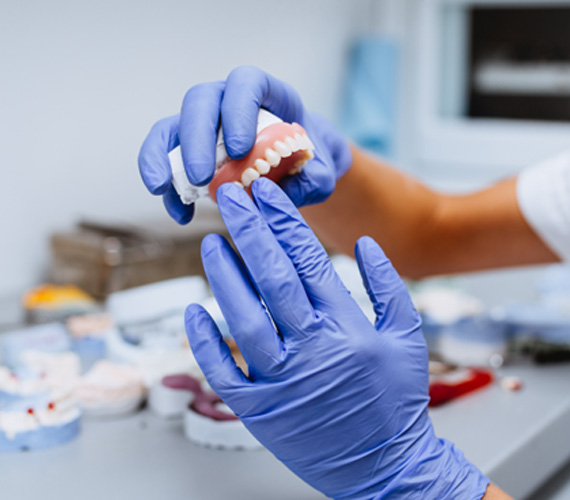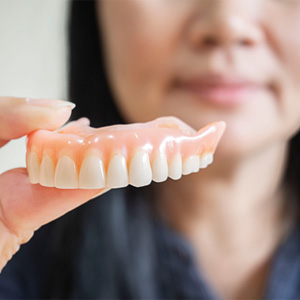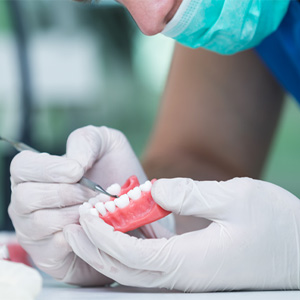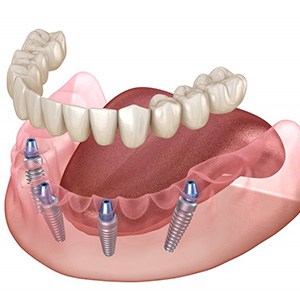Dentures – Fort Worth, TX
Renew Your Entire Smile
Losing even a single natural tooth can be challenging; losing all of the teeth in your upper or lower arch can be downright debilitating. No matter what the reason for extensive tooth loss is, dentures are often the best solution for restoring your smile, allowing you to eat a healthy variety of foods and speak with confidence at work or at social gatherings. Call our office today to schedule a consultation with us and see if dentures could help you regain a beautiful, functioning grin in the near future.
Why Choose Harris Parkway Dental Care for Dentures?
- Long-Lasting, Lifelike Dental Prosthetics
- All PPO Insurance Plans are Welcome
- Dental Implants Placed In-House
What are Dentures?

Dentures are artificial teeth and gums that are used to replace missing teeth. Full dentures can replace an entire row of teeth while partial dentures fill in gaps scattered throughout the mouth. Both consist of a gum-colored base and an appropriate number of lifelike teeth. Dentures can be made of a few different materials, but most of the time they’re made from a special plastic called acrylic resin. Both types of dentures can be attached to dental implants for better stability, improved strength, and increased comfort.
Who’s a Good Candidate for Dentures?

Dentures can be a life-changing tooth replacement option for people who are missing multiple, most of, or all of their teeth. During your consultation with us, we will examine your mouth to determine the number of teeth that are missing and whether dentures are ideal for you. Until then, here are some things for you to take into consideration.
Effects of Missing Teeth

Teeth are very strong. Tooth enamel is the strongest part of the entire body! However, they aren’t completely indestructible. Teeth can be lost in a variety of different ways, including tooth decay, gum disease, and trauma to the mouth. According to the American Academy of Periodontology, there are numerous negative effects of tooth loss, including facial sagging, difficulty speaking, trouble eating, and low self-esteem. When you replace your missing teeth with dentures, you can improve all of these parts of your life.
What Qualifies You for Dentures?

Dentures are ideal for people who are missing several, most of, or all of their teeth. Depending on the number of teeth you are missing and where they are located in the mouth, we can put together a custom plan for you. It’s important to have good oral health before getting dentures, so any tooth decay or gum disease needs to be eliminated ahead of time. Once your dental health is in good shape, we can move on to your dentures.
Alternative Tooth Replacement Options

Dentures aren’t the right option for everyone. Here are a couple of other tooth replacement options that we offer:
- Dental Bridges: A dental bridge works by bridging the empty space with a replacement tooth. The replacement tooth, also called the “pontic,” is supported by two dental crowns that are placed on the adjacent teeth. This is ideal for patients who are only missing one or a couple of consecutive missing teeth.
- Dental Implants: A dental implant is a screw-like post that is surgically inserted into the jawbone to support a replacement tooth. This requires that the patient has a strong and sufficient jawbone. Dental implants cost more than dentures, but they are made to last for multiple decades or even the rest of your life!
Different Types of Dentures

Partial dentures, full dentures, and implant dentures all have their own advantages and benefits:
- Partial dentures can be customized in order to replace any number of teeth in the mouth no matter where the gaps are located. They are held securely in place thanks to metal clasps on your natural teeth.
- Full dentures can rest directly on the gums and can easily be removed for cleaning purposes. You can also stabilize them further with denture adhesive.
- Putting dentures on dental implants will let your jaw continue to enjoy the stimulation it needs to maintain itself. You can brush and floss implant dentures as if they were natural teeth.
How Dentures are Made

Before you commit to dentures, it’d be good to learn how they’re made. You’ll have more respect for your new teeth (and the team that makes them) that way. Still, finding the facts on denture creation can be tricky; you may not know where to start. The good news is that we’ve listed a helpful summary of how dentures are made. To learn the ins and outs, just keep reading or call us for the details.
What are Dentures Made Of?

No matter the type, every denture has a base and some artificial teeth. These parts are crucial and form most (if not all) of each prosthetic. That being said, consider their features below:
- Denture Base – A denture’s base is the core structure that supports its teeth. For that reason, it’s often made of durable acrylic, nylon, porcelain, or metal. Most denture bases now use acrylic, though nylon can be a good substitute.
- Artificial Teeth – Artificial teeth (per their name) are a denture’s tooth-replacing portions. Labs make them from resin or porcelain that matches your enamel’s color.
The Denture Creation Process

Since each denture is customized for its patient, making one involves a multi-step process. The relevant steps are:
- Step 1: To start, our dentists will take an impression of your mouth. Doing so lets us make a plaster model that matches your denture’s size and shape.
- Step 2: We’ll send the model to a dental lab, which will use it to create a wax gumline.
- Step 3: Once the wax gumline is ready, lab workers will set artificial teeth in it. They’ll then have made a prototype denture for the final one.
- Step 4: We’ll receive the prototype denture and see if it fits your mouth. Afterward, we’ll return it to the dental lab.
- Step 5: A worker will place the prototype in a flask after boiling it to remove its wax. As for the flask, this object will receive plaster and sit in hot water.
- Step 6: A separator will go into the plaster layer, keeping the acrylic from sticking. This material will be injected into the flask to replace the wax.
- Step 7: Lab workers will remove all plaster to reveal the final denture. Then, they’ll place the restoration in a bath to remove its residue.
- Step 8: Workers will cut off the excess acrylic and polish the denture.
- Step 9: We’ll have your final denture fitted, ensuring it works smoothly and easily.
Adjusting to Your New Dentures

When you first get dentures, wearing them can cause some soreness. That’s normal – your mouth will need some time to adjust to your new teeth. Once you’ve had the prosthetics for a few weeks, they should feel more familiar and won’t cause problems.
Of course, you can speed up your adjustment. A great go-to method would be exercising your facial muscles; you’d strengthen them to handle dentures. On the other hand, you could eat soft foods (to avoid pain) or use adhesives (to enhance security). These and similar habits would help the dentures feel more natural.
Please contact our office if your denture pain persists. In that case, your new restorations may need a few more alterations.
Tips for Day-to-Day Use

Dentures need to be brushed on a daily basis. Always take them out of your mouth first, then brush them with damp soft-bristled brush and mild hand soap. Soak them in dental cleanser every night to get rid of any food, plaque, and bacteria that may have accumulated during the day. If your dentures aren’t anchored to implants, you should take them out of your mouth at night to give the gums a chance to heal from any soreness or irritation that occurred during the day.
The Benefits of Dentures

When you have a full set of healthy teeth, it is easy to take them for granted, but for those who have missing teeth, dentures can be a godsend and bring back their smile’s function and appearance. However, these prosthetic replacements restore much more than just teeth—they can make a huge difference in almost every part of your life.
Psychological Benefits
Tooth loss can be devastating not only physically but also mentally and emotionally. After all, your smile has a reciprocal relationship with your happiness. You show your joy through a smile, but did you know that you can also become happier when you smile more? If you are embarrassed by your tooth loss, you may not want to show your smile, which can negatively impact your mental health over time.
In addition, your confidence can take a huge blow when you lose teeth. However, when these gaps are filled in with realistic tooth replacements, you can feel more self-confident.
Clearer Enunciation
Have you ever tried to have a conversation without dentures in with someone? You quickly find out just how important teeth are in oral communication. S, z, f, v, t, d, and th are all sounds that require stable teeth to produce correctly. When you have properly fitting dentures in your mouth, you can pronounce each sound and be understood.
As an added benefit of implant dentures, you never have to worry about your replacements coming loose while you talk, even years after getting them!
Improves Nutrition
If you have no or only a few teeth, eating nutritious foods is difficult to say the least. Your only option is to gum heavily processed and cooked foods that are soft enough. On the other hand, with dentures that are secure, especially implant dentures, you have the ability to bite and chew raw fruits and vegetables, whole grains, and other foods that nourish and strengthen your body. As a result, you can significantly improve your quality of life and even extend your lifespan.
Preserves Oral Health
If you have some natural teeth left in your smile, getting a partial denture can help you hold onto them for longer by keeping these teeth properly positioned. With gaps, teeth spread out to fill the space, increasing the risk of more tooth loss. Dentures can help your teeth stay in their proper places.
Believe it or not, implant dentures go a step further for your oral health. By being grounded in the jawbone, implants stop the natural process of bone resorption after tooth loss. As a result, you retain a stronger bite and a stronger jawbone.
Expands Opportunities
The stigma against tooth loss is unfortunately still alive and well. Others can make certain assumptions about you based on your smile in various settings, like at a job interview or on a first date. Replacing missing teeth with dentures can open doors for you that otherwise might be closed. Basically, dentures can give you a new chance in your career or help you find someone special.
Understanding the Cost of Dentures

The cost of dentures will vary from patient to patient, as every case is different and there are all sorts of factors that contribute to the price. During your initial consultation with us, it will be determined exactly how much you can expect to pay for your new restoration. Until then, here are some things that you should keep in mind.
Factors that Affect the Cost of Dentures

There are a few main factors that will influence the cost of your dentures:
- The preparation before getting your dentures will influence the overall cost. This includes things like extractions and gum disease therapy, if needed.
- The materials used for the base and replacement teeth. The base is typically made from acrylic while the replacement teeth can be crafted from either acrylic or porcelain.
- The number of teeth that you need to have replaced.
Remember that cheaper dentures don’t mean better dentures. If you end up opting for budget dentures, they will be more likely to require repairs or replacements much sooner than quality ones. You don’t want to end up with a subpar restoration.
Are Implant Dentures More Expensive?

Implant dentures cost more than traditional dentures, but for good reason. Instead of being supported by the shape and suction of your gums, implant dentures are held in place by a series of dental implants that are placed in the jawbone via a surgical procedure. This allows for many additional benefits, like being more lifelike and having additional stability. You won’t need to replace your dentures every 5 to 7 years either, as implants are made to last several decades.
Does Dental Insurance Cover Dentures?

You can usually expect some level of coverage with most dental insurance plans. Many provide up to 50% coverage, but this will vary depending on your plan. We are in-network with Delta Dental, but we also welcome out-of-network providers. If you have any questions about your coverage, talk to one of our friendly team members.
Other Options for Making Dentures Affordable

If you don’t have dental insurance, this doesn’t necessarily mean that you’re left completely on your own. We have an in-house dental savings plan that acts as a membership. Once you enroll, you can gain access to your most essential dental services, and you won’t need to worry about meeting deductibles either.
We also offer two alternative financing options: Compassionate Finance and CareCredit. Compassionate Finance offers many financing options that can be coordinated through our dental office. CareCredit is a healthcare credit card that makes managing monthly dental payments easy and affordable. Give us a call to learn more and see if you qualify.
The best way you can learn how much dentures will cost for you is by scheduling a consultation. We are looking forward to helping you get your smile back!
Dentures Aftercare

Your dentures can help your smile stay healthy, beautiful, and complete for years if you take excellent care of them, and adopting a few simple habits will help you keep your restoration in great condition for as long as possible. Here’s a quick look at a few of the best ways to keep removable or All-on-4 dentures gorgeous and functional from the friendly team at Harris Parkway Dental Care.
Removable Dentures

Remove After Eating
Following each meal, remove and thoroughly rinse your dentures to eliminate loose plaque and food debris. However, take care not to use hot water, as sudden temperature shifts can cause your appliance to warp and lose its fit.
Clean Your Restoration
At least once a day, take your dentures out for cleaning. Brush each of their surfaces with a soft-bristled brush and a little bit of mild dish soap, unscented hand soap, or an approved denture cleansing product. Refrain from using normal toothpaste, as this is abrasive enough to leave small scratches in your artificial teeth. If you are not wearing your restoration immediately afterward, place it in a glass with lukewarm water or an approved denture-soaking solution to keep it from drying out and warping. Before placing your dentures back in your mouth after soaking, be sure to thoroughly rinse them to eliminate harsh cleaning agents that should not be ingested.
Keep Your Dentures Safe
When you remove your dentures for cleaning, place folded towels across your countertop and fill the basin of your sink with lukewarm water to create a cushion in case you drop them. It’s also important to always keep your appliance away from small children and curious pets.
Remove Dentures When You Sleep
Sleeping while wearing your dentures is associated with bad breath and an increased risk of pneumonia, and wearing your appliance for days without end will deprive your gums and jaws of the rest they need to clean themselves and stay healthy. To prevent this, go without wearing your dentures for at least eight hours each day. Most patients do so by removing and soaking their dentures before going to bed.
Notice Changes
Be on the lookout for signs of poor fit such as clicking, popping, or shifting as well as symptoms of infection like irritation, inflammation, or a foul taste in your mouth. Bring any changes you notice to the attention of the team at Harris Parkway Dental Care so we can adjust, repair, or replace your denture as necessary. Never attempt to repair your dentures on your own, as you may damage them further or injure yourself in the process.
All-on-4 Dentures

Brush your All-on-4 dentures twice daily using a soft-bristled manual or electric toothbrush and a non-abrasive toothpaste. Refrain from using products that contain baking soda or stain-fighting agents, as these can be harsh on your artificial teeth. You must also floss your dentures at least once a day using traditional dental floss, floss threaders, or a water flosser. You’ll also need to clean between the restorations and the gums, and many patients find that using sulcus brushes makes this task easier. It’s also important to rinse your mouth each day with antibacterial mouthwash to inhibit the growth of harmful bacteria.
Denture FAQs

Want to know more about dentures in Fort Worth? Our talented team has collected some of the most common questions about this popular restoration and answered them below. You may find this information helpful if you are considering replacing multiple missing teeth. Schedule an initial consultation with our doctors at our office to learn even more!
What Is the Average Age for Dentures?
While not every person will experience tooth loss in their lifetime, it is an issue that becomes far more common among older patients. In general, you are more likely to need partial or full dentures over the age of 40. According to the National Center for Health Statistics, over 65% of adults between the ages of 40 and 64 are missing at least one tooth, compared to only 33% of adults aged 20-39. Meanwhile, the American Dental Association reports that nearly 57% of people ages 65 to 74 wear some form of denture. It’s important to note, however, that people under the age of 40 can also be potential candidates for dentures.
What Can’t You Eat with Dentures?
You will likely have to adjust your diet when wearing dentures in Fort Worth. Sticky foods like peanut butter, for example, can pull your dentures out of place. This can not only irritate your gums but also allow food particles to become trapped under your false teeth. In addition, nuts, popcorn, apples, carrot sticks, corn on the cob, and other hard foods can damage or dislodge dentures. While it’s okay to enjoy these foods every once and awhile, they should be avoided for the most part. Finally, tough meats like steak and pork chops require extra chewing to break down, which can put a lot of stress on both your dentures and your gums.
Is It Hard to Talk with Dentures?
When you first get dentures, it may take you a little while to get the hang of speaking with your new set of artificial teeth. The length of this adjustment period varies from person to person. Generally speaking, the more you practice, the faster you will grow accustomed to talking with dentures. Reading out loud to yourself and repeating difficult-to-pronounce words is a good exercise. In addition, fast speech may come out muffled if you’re not used to talking with dentures, so feel free to speak slowly at first. If you notice your dentures have a tendency to shift while you speak, try biting down and swallowing before you begin so that your false teeth are in the proper position. If you need a little extra help, you can apply denture adhesive for added stability.
Can I Sleep with My Dentures?
Most denture dentists in Fort Worth recommend taking your dentures out at night when you go to bed. However, when you first get dentures you should keep them in your mouth for 24 hours. After that first day and night, be sure to remove your dentures before you go to sleep. Why? Wearing dentures restricts the circulation in your gums, leading to soft tissue irritation and potentially speeding up ridge resorption. Taking dentures out at night gives your gums a chance to recover and get the nutrients they need. Sleeping with dentures has also been found to be associated with a higher risk of pneumonia. This is likely because the dark, moist space underneath dentures is an ideal place for bacteria to thrive. To protect your oral health and keep your gums healthy, don’t sleep with your dentures.
